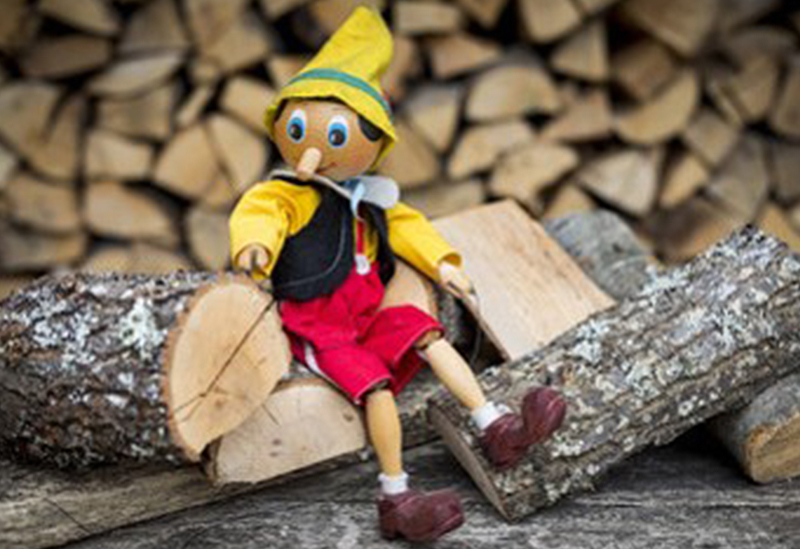Opera Ensemble brings new life to ’Pinocchio’
Show will take place Sunday, Dec. 9, at Anderson Center Chamber Hall

It’s never too late to learn the value of honesty. In an operatic version of the children’s story “Pinocchio,” the Binghamton University Opera Ensemble hopes to delight audiences young and old while spreading the important message that telling the truth is always the best choice.
Based on Carlo Collodi’s original novel, the show includes music from operas by Mozart, Donizetti, Offenbach and Pergolesi.
“All the music in it comes from other operas, which I think is really wonderful,” said Carol Castel, the stage director. “The sounds and the nature of the music are not childish at all. It’s real, honest-to-goodness music that someone’s actually put words to.”
Castel and her cast will present “Pinocchio” at 4 p.m. Sunday, Dec. 9, in the Anderson Center Chamber Hall. Tickets are $15, general public; $10, faculty/staff/seniors/alumni; and $5, students.
Adapted by opera and concert singer John Davies, “Pinocchio” follows the story of a wooden boy who learns through his naïve mishaps the value of being truthful. The production is full of whimsical characters and dance numbers, including a “puppet scene” inspired by the comic opera “The Pirates of Penzance.”
“I’m pretty excited about that scene. The choreography is really cute,” said Carina Kahane, a graduate student playing one of the puppets. “What I’m most excited for is to see how the kids react to the whole thing. Some of the schools are having their younger kids learn some of the choruses beforehand so they can come on stage and sing along.”
The interactive aspects of the opera will occur during three children’s shows, which cast members will perform exclusively for schoolchildren in the days leading up to the Sunday show.
Castel hopes putting on a show that is compelling to all ages will encourage young people to be open to opera, which is an art form she believes is often misunderstood.
“The idea is to get to the kids early enough that they understand that the operatic style is accessible, and it’s another form that they can certainly get into,” she said. “I want them to enjoy it, I want them to leave happy … and to know that lying is not good!”
The fablesque nature of the production, Castel said, does not mean the music is simple or watered down.
“It’s really good, exciting music,” she said. “And the music has an energy to it that simple little tunes just don’t have. So there’s that complexity but yet it’s accessible for the kids, and that’s exciting to me.”
Graduate student Jenna Stewart, who will play one of the Pinocchios, said she admires the opera’s fairytale aspects for its bright energy and wholesome takeaways.
“The show is upbeat, and I think the kids are going to really enjoy it and everyone can come,” she said. “What’s special about it is that it’s interactive and it has a good message about being honest and trying to do your best.”
Stewart’s duet with Evan Nelson, a graduate student playing Pinocchio’s father Geppetto, continues that light-hearted attitude, as he said it is one of his favorite scenes.
“It’s a fun little thing and it’s also a well-known duet from opera, so it’s a nice parallel between the two for the kids to learn more about what opera is,” Nelson said.
Though the extensive original narrative requires the hour-long opera to be condensed, the cast will be doing the entire adaption. John Isenberg, the show’s music director, believes that this is what makes the production truly stand out.
“It’s written to have a few scenes that could be interchangeable or cut,” he said, “but all the optional choruses we are including.”
One of these optional scenes includes a powerful face-off between the evil puppet master Dulcamara and Geppetto.
“The original music is from ‘Don Carlo,’ the Verdi opera. It’s the Grand Inquisitor scene, and it really sets the mood,” Isenberg said. “I actually now couldn’t imagine doing it without that scene.”
Most of the original characters in the story are in this version in one form or another. Davies’ adaptation also includes the character Olympia, a mechanical doll from Offenbach’s opera “The Tales of Hoffmann.”
While the children are an important focus for the cast, Isenberg believes that the cleverness of the scenes makes the show entertaining on several levels for older audiences as well.
“It’s like situational comedy, where (Davies) will take one scene that works in a certain way in one opera, and adapt it in the same way for a completely different story,” Isenberg said. “So it’s very clever.”
Above all, the cast hopes the audience — adults and children alike — leave the show with a smile.
“I just want them to have a good time and have some fun,” Nelson said. “Usually operas are pretty serious, so this is definitely going to be a lighter afternoon of music!”
